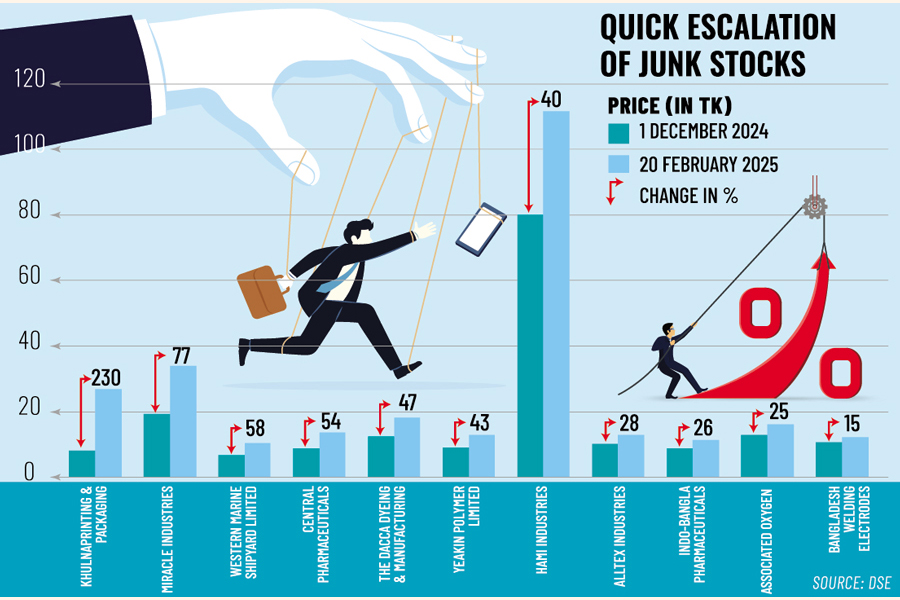Gamblers still active in market in changed climate, despite punitive actions

Published :
Updated :

 The stock of Khulna Printing & Packaging more than tripled in the three months through Thursday despite repeated warnings by the Dhaka Stock Exchange (DSE) that it was non-operational.
The stock of Khulna Printing & Packaging more than tripled in the three months through Thursday despite repeated warnings by the Dhaka Stock Exchange (DSE) that it was non-operational.
The packaging company's factory has been producing nothing since 2021. Accumulated losses in the five years to December 2022 amounted to Tk 968 million. The company has not published more recent financial results.
With such a grim image of Khulna Printing, the stock soared. Several other junk stocks have beaten their industry peers that are in regular business operations, have posted profits and given dividends regularly to shareholders.
Many of the junk stocks made it to the top gainers' list in recent weeks, bringing into question investors' preference for such shares.
Analysts said speculative trading and short-term profit motives might have fueled the market valuation of junk stocks.
Akramul Alam, head of research at Royal Capital, said price manipulation was the major reason behind "abnormal" price surges of companies out of business.
Gamblers pushed up the prices of junk shares through
serial trading and then spread rumours among general investors. Some investors aim to make hefty profits overnight and become rich. They get trapped by gamblers, added Mr Alam.
Investors may wonder who these gamblers are when the securities regulator has been working to bring reforms to the market and many alleged fraudsters, who manipulated the market under the watch of the previous commission, are either behind bars or under regulatory scrutiny.
Western Marine Shipyard, Miracle Industries, Appollo Ispat Complex, Yeakin Polymer, Active Fine Chemicals, and Safko Spinning Mills have been flying high on the prime bourse.
A company's stock is labeled as junk when its commercial production has remained shut for six months in a row, when it has failed to hold annual general meetings on time or failed to provide dividends for two consecutive years.
Institutional investors also bet on speculative stocks amid a lack of investable stocks; the number of junk stocks has recently crossed 100 in a small market of 359 equity-based securities.
The newly-formed securities commission has already imposed big fines on several companies and individuals for their involvement in share price manipulation.
An official of the Bangladesh Securities and Exchange Commission (BSEC) said the surveillance team of the regulator is keeping an eye on daily trading and taking actions as per rules.
However, punitive regulatory actions seem to have failed to work as a deterrent.
The BSEC official, who spoke on condition of anonymity, said the regulator would conduct investigations to identify irregularities and take necessary actions against those guilty of them.
In a major drive to enforce compliance, the regulator slammed big fines on several market manipulators and companies for involvement in malpractices during the previous commission.
In October last year, the BSEC imposed a record fine of Tk 4.28 billion on five companies and four individuals for artificially inflating the share price of Beximco.
Still, gamblers are active in the market, reflected in the price surge of poor-performing stocks.
Record number of junk stocks
Currently, about one-third companies in the stock market are junk stocks. More than 60 companies were relegated to the junk category last year while this year the number is 16.
Market operators say that the latest regulatory directive issued in May last year about features of junk status is the major reason for the rapid increase in the number of junk stocks.
As per the latest directive, if a listed company fails to distribute 80 per cent of the declared dividend within the stipulated time and fails to hold the annual general meeting on time, the company should be listed under Z category.
These two provisions have led to the downgrading of several listed companies in recent times.
A DSE official said the prime bourse downgraded more than a dozen companies recently for their failure to disburse approved dividends within the deadline.
The record number of junk or Z category stocks is worrisome for the market's growth. It is sending an alarming message to domestic and foreign investors.
Minhaz Mannan Emon, a DSE director, said more than a hundred companies were now in Z group due to wrong decisions made by the previous commission.
Market participants, including the stock exchanges, had been opposing the listing of bad companies for 15 years during the regime of the previous government. But the past commission did not pay heed to them.
The current method of classification of listed companies needs rethinking, said Mr Emon. Otherwise, the number of investable shares will decrease further, creating a chaotic situation in the market.
Moreover, the authority of listing and delisting of companies should be handed over to the stock exchanges, added Mr Emon.
babulfexpress@gmail.com


 For all latest news, follow The Financial Express Google News channel.
For all latest news, follow The Financial Express Google News channel.